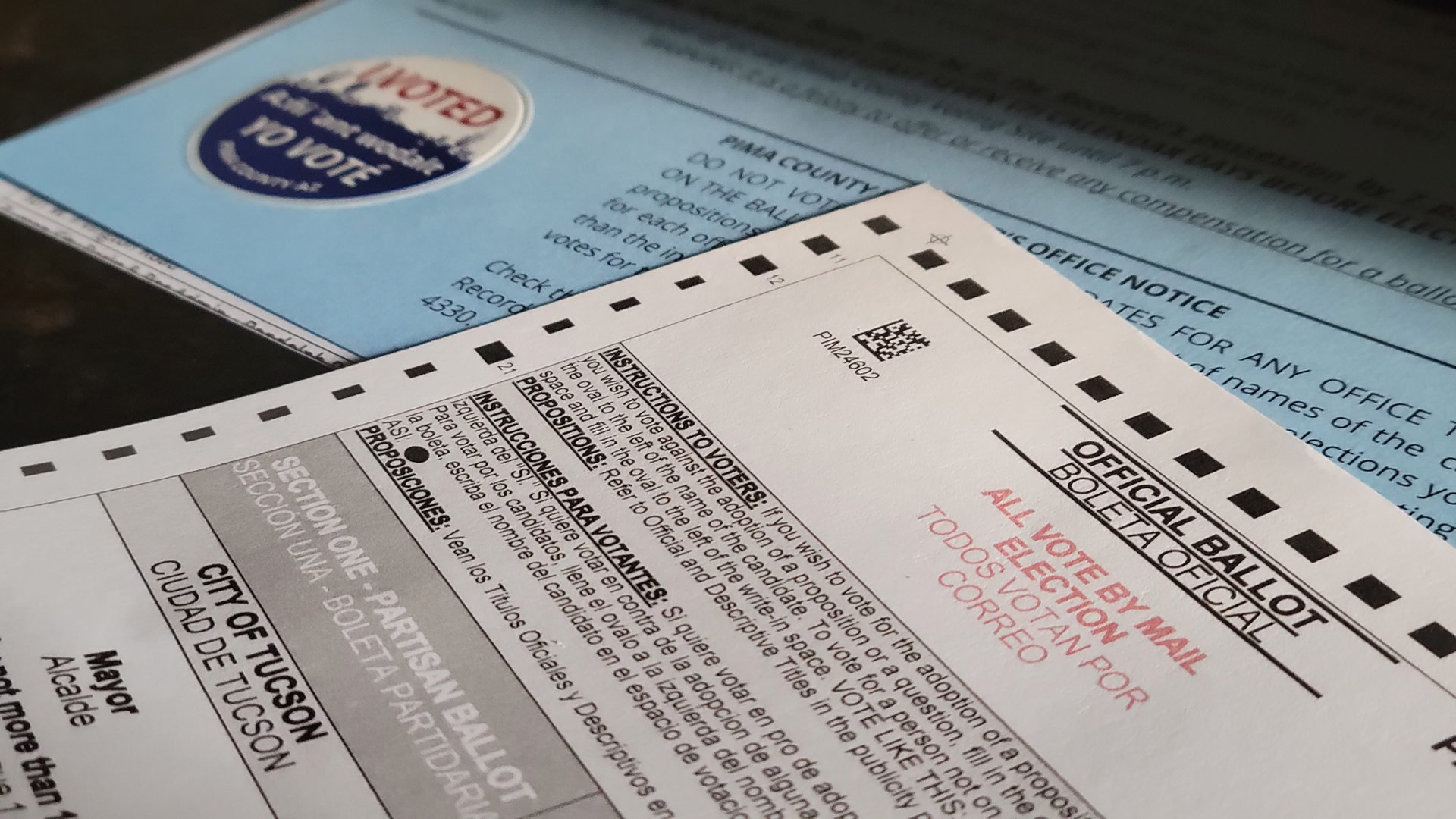 A mail-in ballot from the 2023 Pima County Election.
A mail-in ballot from the 2023 Pima County Election.
The Buzz for February 16, 2023

Last week saw a rare occurrence in the Arizona Legislature. Members of both parties came together and negotiated a bill that changed how Arizona will do elections for a few years.
The bill was spurred on by concerns that the state's new law that requires a recount for margins of one half of one percent or less would cause the state to miss federal deadlines.
And last Friday, Governor Katie Hobbs signed that legislation into law. During a visit to Sierra Vista this week, she said the bill was pushed forward by election conspiracy theories.
"It was not necessary, but certainly has triggered additional recounts that consume the time of election administrators, and after a primary will make it harder to get ballots out in time to those overseas and military voters and after the general could jeopardize our electoral votes in the presidential [election] if there's a recount there. So we needed to address it. the legislature was unwilling to revisit the recount threshold, and so the deadlines was the other issue we could work with."
The changes are meant to either speed up or give election workers more time to count ballots.
The most notable of them is that this year, Arizona's primary will be held on July 30, a week earlier than it would traditionally be held.
There will also be temporary changes to how election workers go about verifying signatures, setting forth exact guidelines about how signatures are compared.
The time that voters who cast a provisional or early ballot have to fix an issue with their signature, going from five business days to five calendar days. For a typical Tuesday election, that means the last day to cure an issue would be a Sunday.
But, starting in 2026, dropping off an early ballot at a polling place a way to bypass issues such as signature checks if they show their ID to a poll worker to verify their identity.
The bipartisan bill was a compromise after legislative Democrats and Republicans initially both put forward their own bills.
"This was a lot of compromising. I was at the legislature all last week, said Jen Fifield, an Arizona-based reporter for Votebeat. "They tried really hard to get to a place where they could get that permanent change. But Republicans wanted to switch the primary date permanently to May, and the governor's office was not willing to do that. The governor's office, or at least Democrats, wanted to make it permanently that last week of July. So that along with the change to how are verified, the timeline, those are both temporary measures just so they could get the bill across the finish line."
While legislators frequently claim that these changes have the approval of those who administer elections, not all provisions are universally accepted.
"Overall, this is still a piece of legislation that was passed that creates some disruptions, but it was meant to solve a problem that was created by the legislature to begin with," said Pima County Recorder Gabriella Cázares-Kelly.
Chief among the issues is the shortened time frame for curing a ballot that has a signature issue or finalizing a provisional ballot.
"We're so big geographically, to get those early ballots and those provisional conditional ballots back to Flagstaff, that takes all day Wednesday. So we won't even know there's a problem for some of these voters possibly until Friday or Saturday morning," said Coconino County Recorder Patty Hansen.
Coconino County is 18,619 square miles, making it the second largest county in the U.S., but its population is around 135,000.
Hansen said that leaves voters with little more than a day to fix an issue across the sprawling county.
Another issue for counties like Pima and Coconino is where they often set up shop for those who are trying to cure a ballot.
"We hold on to [conditional provisional ballots] until you go to one of our identification resolution stations, which normally we have 30 of them. 27 of them are Pima County Libraries and one is a tribal government office. Of those, only a handful are open on a Saturday, all of them are closed on a Sunday. In order for me to host what I need to in order to have my staff be able to answer phones on all day, Saturday and all day Sunday, and be able to meet somebody at the door to take a look at their driver's license and fill out the appropriate paperwork to resolve that conditional provisional ballot, I need to have a full staff.," said Cázares-Kelly.
Hansen said Coconino County often partners with Navajo Nation chapter houses, which are not open on the weekend.
Both say they will be struggling to find a solution and will likely be hiring additional temporary staff to fix the problem.
Cázares-Kelly and Hansen encourage early and provisional ballot voters to place their phone number on the space provided, and sign up for ballot tracking provided by the Arizona Secretary of State's office so they are informed of an issue as soon as possible.
Another issue that county recorders do not approve of is the moving of this year's primary election.
Hansen sent out a press release this week noting that voters would receive a voting guide for the Presidential Preference Election that has outdated information, saying the state's primary election is August 6.
"We think [the voter guides] are important. This is our fifth one. We have found it's very well received by the voters. And people have told me, they cut that important date section out and put it on the refrigerator."
She said her office will be sending out a second version of their voter guide in April at an estimated cost of $50,000-$60,000. She hopes the state will help cover those costs.




By submitting your comments, you hereby give AZPM the right to post your comments and potentially use them in any other form of media operated by this institution.